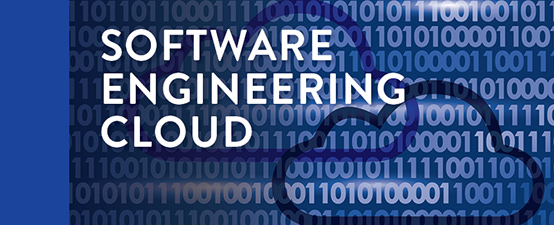
Overview
Software Engineering Cloud Certificate requires 60 hours of training to complete the certificate. Most students will take classes from the listing below to complete the certificate. Other students, based on experience, can elect to substitute courses from this certificate or other certificates including: Introduction to Software Design and Engineering, DevSecOps for Software Engineers and Architects, SAFe for Engineers and Architects. Each course counts towards one certificate only.
AWS Academy Cloud Foundations (AWS Certified Cloud Practitioner) (18 Hours)
AWS Academy Cloud Foundations is intended for students who seek an overall understanding of cloud computing concepts, independent of specific technical roles. It provides a detailed overview of cloud concepts, AWS core services, security, architecture, pricing, and support.
AWS Academy Cloud Architecting (AWS Certified Solutions Architect Associate) (36 Hours)
AWS Academy Cloud Architecting covers the fundamentals of building IT infrastructure on AWS. The course is designed to teach solutions architects how to optimize their use of the AWS Cloud by understanding AWS services and how they fit into cloud-based solutions. Although architectural solutions can differ depending on the industry, type of application, and size of the business, this course emphasizes best practices for the AWS Cloud that apply to all of them. It also recommends various design patterns to help you think through the process of architecting optimal IT solutions on AWS. Throughout the course, students will explore case studies that showcase how some AWS customers have designed their infrastructures and the strategies and services that they have implemented. Finally, this course provides opportunities for students to build a variety of infrastructures through a guided, hands-on approach.
Google Cloud Fundamentals (Associate Cloud Engineer) (18 Hours)
Welcome to Google Cloud Fundamentals (Associate Cloud Engineer Exam). This course provides basic knowledge of cloud concepts, billing and cost management, core Google Cloud compute, storage, database, networking, and analytics services, management tools, security features, monitoring and logging, and identity, governance, privacy, and compliance features. You will find this course valuable if you are just beginning to work with cloud-based solutions and services or are new to Google Cloud. This course maps to the Google Cloud Fundamentals (Associate Cloud Engineer Exam). You will benefit most from this course if you intend to take the Google Cloud Fundamentals (Associate Cloud Engineer Exam). Google Cloud Fundamentals can be used to prepare for other Google Cloud role-based or specialty certifications, but it is not a prerequisite for any of them. This course assumes you have basic knowledge of general technology concepts, including concepts of networking, storage, compute, application support, and application development.
Microsoft Azure Fundamentals (12 Hours)
This two-day course will provide foundational level knowledge on cloud concepts; core Azure services; security, privacy, compliance, and trust; and Azure pricing and support. Note: This course provides an Azure pass and time for students to participate in hands-on labs. If you do not need hands-on experience, consider the AZ900T01: Microsoft Azure Fundamentals (1 day) course. The content for both courses align to the AZ-900 exam objective domain. This course is suitable for IT personnel who are just beginning to work with Azure. This audience wants to learn about our offerings and get hands-on experience with the product. This course primarily uses the Azure portal to create services and does not require scripting skills. Students in this course will gain confidence to take other role-based courses and certifications, such as Azure Administrator. This course provides an Azure pass and optional lab environment. This course combines lecture, demonstrations, and hands-on labs.
Microsoft Azure Administrator (24 Hours)
This course teaches IT Professionals how to manage their Azure subscriptions, create and scale virtual machines, implement storage solutions, configure virtual networking, back up and share data, connect Azure and on premises sites, manage network traffic, implement Azure Active Directory, secure identities, and monitor your solution. This course is for Azure Administrators. Azure Administrators manage the cloud services that span storage, networking, and compute cloud capabilities, with a deep understanding of each service across the full IT lifecycle. They take end-user requests for new cloud applications and make recommendations on services to use for optimal performance and scale, as well as provision, size, monitor and adjust as appropriate. This role requires communicating and coordinating with vendors. Azure Administrators use the Azure Portal and as they become more proficient they use PowerShell and the Command Line Interface.
Advanced Software Engineering Cloud Certificate - 90 Hour
In order to complete the Advanced Software Engineering Cloud Certificate, students must complete 90 hours of class(es) in the Software Engineering Cloud Certificate. Students may elect to substitute hours from any of the certificates listed below:
- Software Engineering and Architecture
- DevSecOps for Software Engineers and Architects
- SAFe for Software Engineers and Architects
- Introduction to Software Design and Engineering OOAD and Programming Track
- Introduction to Software Design and Engineering OS and Network Programming Track
Each course counts towards one certificate only.
